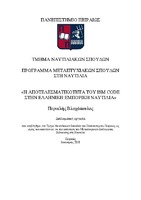Η αποτελεσματικότητα του ISM Code στην ελληνική εμπορική ναυτιλία

Προβολή/
Λέξεις κλειδιά
ISM Code ; Ναυτιλία -- Μέτρα ασφαλείας ; Ναυτιλία -- Δίκαιο και νομοθεσία ; Ανθρώπινος παράγονταςΠερίληψη
Η ασφάλεια της ανθρώπινης ζωής, του υλικού και η προστασία του περιβάλλοντος, ήταν ανέκαθεν ζητήματα που απασχολούσαν τη ναυτιλιακή κοινότητα. Ιδιαίτερα μετα τη δεκαετία του 1960, με την εξέλιξη της τεχνολογίας, τη γιγαντοποίηση των πλοίων και την εδραίωση των μέσων μαζικής ενημέρωσης, η ανησυχία της κοινής γνώμης για τα ναυτικά ατυχήματα, οδήγησε τις κυβερνήσεις να λάβουν μέτρα και να θεσπίσουν νομοθεσίες στο ναυτικό οικοδόμημα. Οι διεθνείς κανόνες που θεσμοθετήθηκαν, αφορούσαν κυρίως την ανάπτυξη της τεχνολογίας και την ασφαλή διαχείρηση του υλικού και δεν λάμβαναν υπ’ όψιν ότι στην πλειοψηφία τους ό,τι τα ατυχήματα οφείλονταν σε ανθρώπινα λάθη και όχι σε αστοχίες ή κακοδιαχείρηση του υλικού.
Ο κώδικας ISM, o οποίος θεσμοθετήθηκε το 1994 από τον ΙΜΟ και αποτελεί κεφάλαιο της διεθνούς σύμβασης για την ασφάλεια της ανθρώπινης ζωής στη θάλασσα (SOLAS), ήρθε σαν αποτέλεσμα των προβληματισμών που δημιουργήθηκαν από την εφαρμογή των διεθνών συμβάσεων και προκειμένου να εισάγει ένα ενιαίο νομοθετικό πλαίσιο, που μέχρι τότε δεν υπήρχε. Έγινε υποχρεωτικός για όλους από το 2002 και έφερε αλλαγές στον ναυτιλιακό κλάδο, όπως αλλαγές στην κουλτούρα των εταιρειών και των εργαζομένων προς την κατεύθυνση της ασφάλειας και της προστασίας του περιβάλλοντος.
Ωστόσο, όπως κάθετι νέο, έτσι και ο κώδικας έφερε αναστάτωση στη ναυτιλιακή κοινότητα. Το να υιοθετήσεις ένα παγκόσμιο νομικό όργανο, όπως ο κώδικας, δεν είναι μία εύκολη εργασία. Επιπλέον, η αποτελεσματική εφαρμογή του και τα αποτελέσματα του στην εξασφάλιση της ασφάλειας και της προστασίας του περιβάλλοντος αμφισβητούνται από πολλούς. Ναυτικά ατυχήματα εξακολουθούν να υφίστανται και μετά την εφαρμογή του κώδικα, παρά τη μείωση τους. Παράγοντες όπως η γραφειοκρατία, ο ανθρώπινος παράγοντας και η κόπωση επηρεάζουν την αποτελεσματική εφαρμογή του.
Η εργασία, μέσω της διεθνούς βιβλιογραφίας προσδιορίζει τους παράγοντες που επιδρούν στην αποτελεσματική εφαρμογή του κώδικα, στα προβλήματα που δημιουργούν αυτοί και στα θετικά σημεία από την εφαρμογή του κώδικα. Επίσης, με την εκπόνηση έρευνας, μέσω ερωτηματολογίου σε στελέχη του ελληνικού και ελληνόκτητου εμπορικού ναυτικού, καταγράφει τις απόψεις τους και εξάγει σημαντικά συμπεράσματα ως προς την αποτελεσματικότητα του στην ελληνική εμπορική ναυτιλία και τελός κάνει προτάσεις για τη βελτιστοποίηση της εφαρμογής του.


